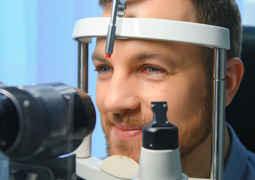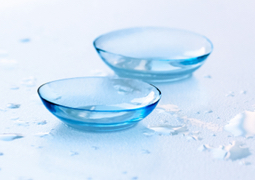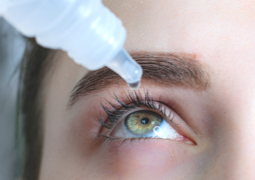If you have Type 1 or Type 2 diabetes, you’ve likely been told that you need to get your eyes checked yearly. Have you wondered why your family doctor is telling you that you need to see your optometrist to help monitor your diabetes?
The short answer is that in an eye exam, your optometrist can see if there’s been any damage to your blood vessels. It’s not easy to see active blood vessels (in fact, your eyes are the only place on your body where it’s possible to see active blood vessels), so your eye exam can give your doctors a good snapshot of what’s happening in your body. (At least, as it relates to your diabetes.)
Your kidneys are actually quite similar to your eyes, so if we see changes in your eyes during an eye exam, your family doctor will often consult with a kidney specialist as well. If you were referred to a kidney specialist after an eye exam, then it might be because there were changes to your eyes during your last exam.
How does diabetes affect your eyes?
Diabetes can cause your blood vessels to become more “leaky.” In your eyes, this means that fluid can leak out of your blood vessels and into the retinal tissue, which then causes swelling and, ultimately, to vision loss.
How does this happen? The best analogy for this process comes from a fellow optometrist: your blood sugars can be described as “chards of glass;” when you have diabetes, you tend to have a higher blood sugar level, which means that you have more “chards of glass” in your blood. Unfortunately, those chards of glass (or sugars) rub against the walls of your blood vessels, leading to a gradual breakdown (and thinning) of the blood vessel walls. Since your arteries and veins are now thinner, fluid can leak out.
Think of it as a leak in your shower: for the most part, you won’t have any problems. But if your tiles aren’t waterproof or the grout starts to break down, water can get into the walls or onto your bathroom floor. And you may not be able to tell you’ve got a leak until after the damage has been done.
How can this be treated?
Swelling can be treated by a retinal specialist (and we have some of the best retinal specialists right here in Calgary). However, the best treatment is prevention. Having a lower blood glucose level will mean having less “chards of glass” in your blood vessels, which will help keep them healthy.
It’s possible to slow the onset and progression of vision effects from diabetes (eye conditions known as diabetic retinopathy and diabetic macular edema) if they’re caught early. This is why it’s important to have yearly dilated eye exams, and it’s why your family doctor is encouraging you to see your optometrist at least once a year.




























